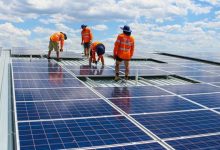Representatives of the Australian solar industry on Wednesday vented their frustration, and their anger, to Queensland government officials in a bid to have new rules that require electricians to be hired to perform manual labour tasks delayed, and reviewed.
RenewEconomy writers have been reporting on renewables and climate policy for more than a decade, through repeated strikes against the carbon price, the renewables target and other policy measure, but have never witnessed the level of fury and exasperation over this new rule.
Some say that the impacts could be so severe, it may threaten the state’s ability to meet its own 50 per cent renewable energy target by 2030.
“I’m ready to throttle someone,” said one senior executive of a solar development company after a 90-minute meeting at Queensland government offices in Brisbane on Wednesday afternoon, attended by some 12 solar industry developers and contractors, and another 15-20 over the phone.
Solar developers warn of massive disruption, delays, jobs losses and rising costs as a result of the decision announced by Queensland Industrial Relations minister Grace Grace that mandates electricians only are to handle solar panels – this includes the manual process of mounting tens of thousands of panels in a large solar farm.
Not even trainees and apprentice electricians will be allowed to do the job. “It’s just gobsmacking,” said another attendee.
Developers fear it will be near impossible to source enough qualified electricians, and teams already hired for ground works will have to be let go.
They forecast delays, which will result in lost revenue and increased finance costs – not to mention higher labour costs – if they can find the electricians. Any workers will have to be fly in fly out basis, not locally hired.
“You are just not going to find that many available electricians in Chinchilla,” said one. “And which qualified electricians are going to want to fly from Sydney or Brisbane just to do menial tasks.”
The Clean Energy Council puts the potential increased cost impacts at up to 4.5 per cent for a large solar farm, or about $9 million for an “average” project cost of $207 million (100MW).
There is concern that installers that specialise in large commercial installations – more than 100kW – will be particularly badly affected and may have to lay off employees because they will no longer be allowed to do the work required.
As we reported last week, Danin Kahn from Today Solar and Huon Hoogesteger from Smart Commercial Solar both warned that many projects would simply not go ahead under such conditions.
The Queensland government claims the added cost for large-scale solar farms will be less than 1.5 per cent, but the industry notes it is only looking at the cost of labour, not the other impacts, and not even the cost of flying in electricians. Some private developers have suggested cost hikes of 7 per cent.
The solar industry is particularly angry that it was not consulted. There was no consultation with industry representatives, the Clean Energy Council only found out by chance, and while invited to make a submission felt it was ignored and was more or less told it was a fait accompli.
The primary push is believed to have come from the main union, the ETU, which was upset by the extended use of back-packers in some situations. Local network operators, other unions, and the networks lobby group and a business lobby group were consulted, the government says.
Attendees at the meeting on Wednesday said official insisted it was a “safety” issue, but provided no evidence of where the safety issues were emerging.
“We are calling on the Queensland Government to delay this regulatory change so that genuine consultation can be undertaken with the industry,” the CEC’s Anna Freeman said in a written statement.
“The regulation was rushed through with no meaningful consultation with the industry or opportunity for the sector to understand the safety issues that the new regulation seeks to address.
“The proper process for the Government to follow would be to commission a regulatory impact statement, along with meaningful consultation with those affected by the change.
“The safety benefits of these changes are unsubstantiated, with the Government not having disclosed the findings of the safety audits that it conducted in 2018. The non-compliance notices that have been cited to us to date appear to deal with infringements of existing legislation, which begs the question of why a costly new regulation is required.”
Freeman echoed concerns by solar developers – including those who have just started construction, or are about to, that the new rules effectively cut local communities out of a significant slice of the job opportunities created by new solar farm developments.
“The Government will effectively be compelling the large-scale solar proponents to rely heavily on FIFO workers,” Freeman said.” The industry has been working to avoid that where possible, because we recognise that employment opportunities through the construction phase are one of the major benefits that these projects can provide to regional communities.”
“Queensland has a significant and commendable target to get to 50 per cent renewable energy by 2030. This is going to require the government and industry to work together co-operatively to maintain the momentum of the transition,” she said.
“This regulation will not help us achieve that goal, and we ask the government to delay the introduction of this regulation so that proper consultation with the industry can take place and we can find a less costly solution for achieving our shared safety aims.”










